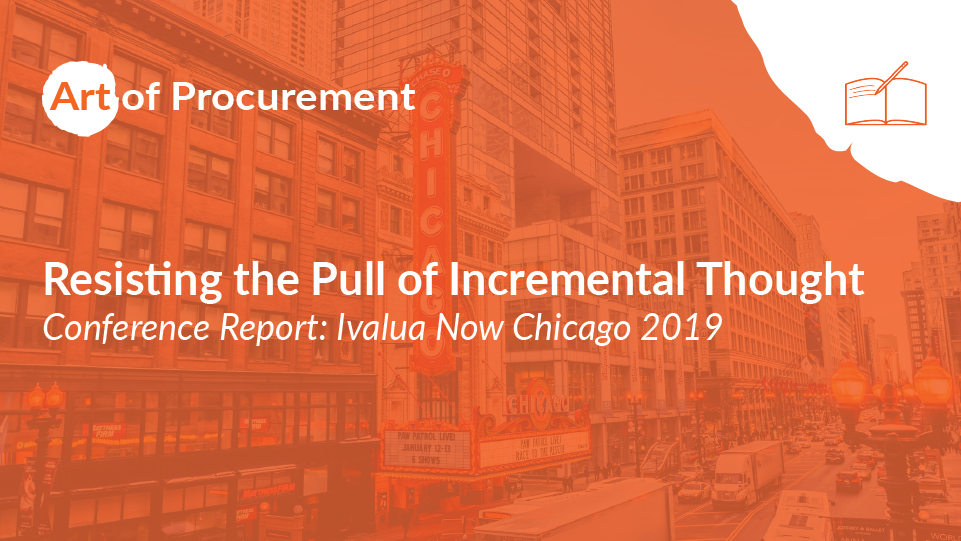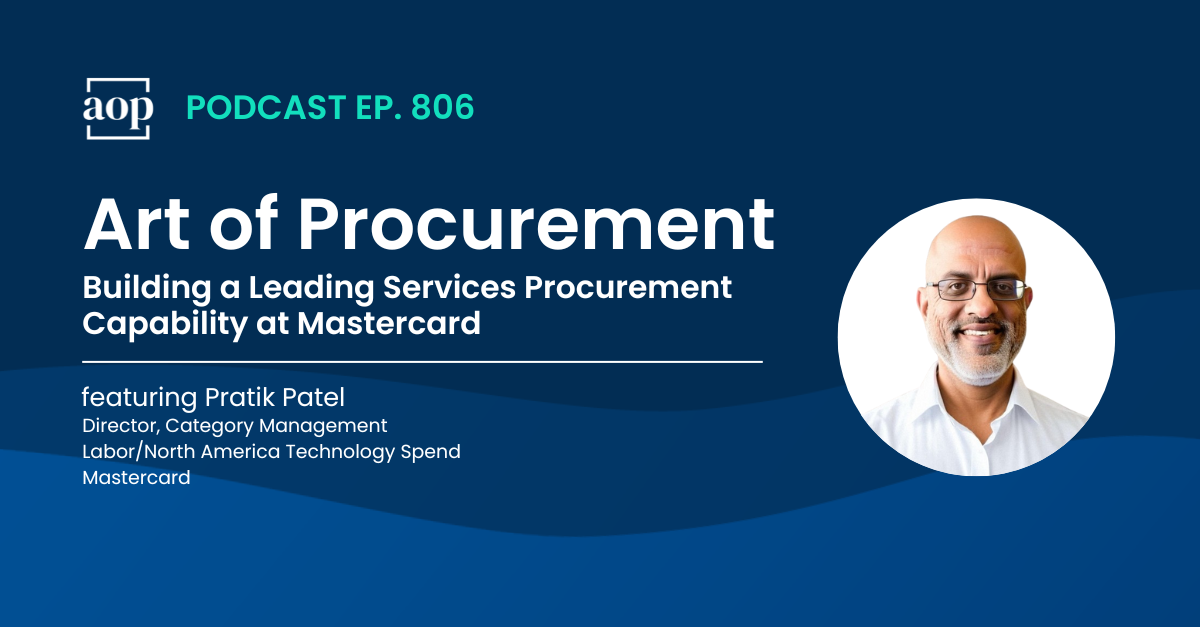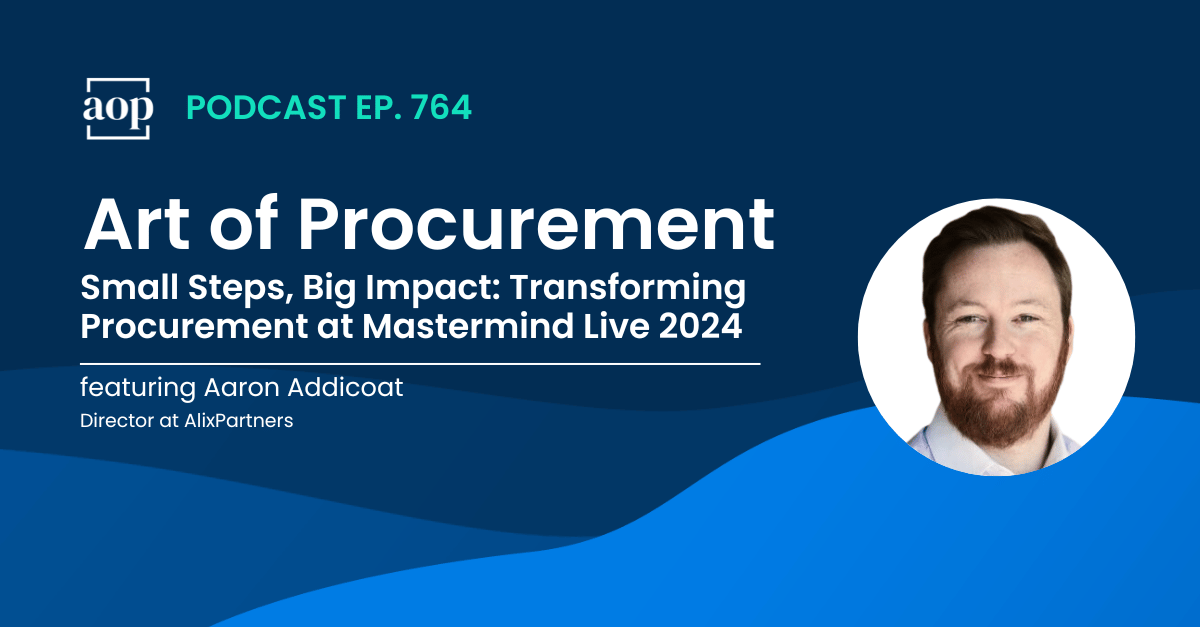
I’ve been traveling so much over the last few weeks that I have to check my calendar on a daily basis to confirm my current location! This week I am in Chicago for the US leg of Ivalua’s Art of Procurement conference series. Expectations for this event are high after their successful (and well-placed) Paris event where over 500 procurement professionals learned and connected under the watchful eye of the Mona Lisa. But Chicago is holding its own, especially with the addition of a stand-out session called “Navigating the Big Shift”. I suspect this perspective on procurement will take a central role in many digital transformation journeys.
Ivalua is clearly doing something right. Founder & CEO David Khuat-Duy reported 98% customer retention, 50% growth, and revenue on target to surpass $100M in 2019. I’m also hearing a lot from Ivalua clients about their procurement transformation journeys. Don’t worry – some of those conversations will find their way into the community discourse (and your office) through upcoming AOP podcasts recorded on site.
My reflections thus far have been dominated by a presentation by Nancy Giordano, Leading Strategic Futurist. On the one hand, I’m somewhat skeptical of bold predictions for the future (flying cars, right?). On the other, I’ve always believed in the following quote from Bill Gates:
“We always overestimate the change that will occur in the next two years and underestimate the change that will occur in the next ten. Don’t let yourself be lulled into inaction.”
Being dutiful procurement professionals (translation: analytical, quantitative, logical), there is always safety in numbers. Nancy started her presentation with a couple of key statistics:
- 100% of all jobs in the future will be ‘reskilled’ in the shadow of artificial intelligence (an idea that has been a mantra of IBM CEO Ginni Rometty)
- 59% of all work done today is either unplanned or not included in the strategic plan supposedly guiding the enterprise
This enormous impending change – not to mention the misalignment between what we do and what we have planned to do – creates a huge challenge for all professionals in all lines of work. In a way, procurement is at an advantage because we’ve been talking transformation for years. In theory, our change management ‘machinery’ should already be in motion (or at least warmed up).
From a skills perspective, we have to be bold, but we still have to get ‘the job’ done. This means showing up and being present in the moment to address the tasks at hand with maximum proficiency. These may be new tasks or unanticipated tasks, but regardless, they are the priority. This is no time to hide. All business models are under stress, with internal and external stakeholders demanding MORE for LESS.
In the spirit of being active participants in the journey towards the future rather than being bewildered victims of its approach. Nancy offered up four key recommendations:
- Wonder (v. Resist) This is a simple idea, but complex to carry out. We have to keep open minds, both when the path forward is uncharted and also when we are confronted with new ideas.
- Navigate (v. Replicate) Working in the midst of constant change means learning to excel in a permanent state of ambiguity. There is no more clear start and end – especially when we are talking about a transformational journey. As a result, our thinking, approach, and processes will have to adapt if they are to be sufficiently agile. The same will be true of familiar roles. Uncommon partnerships (click here for an example) with collaborators and/or competitors will be on the table – and in some cases absolutely necessary.
- LeaderING (v. LeaderSHIP) The time has come to take advantage of the “human cloud”. If we focus less on how to make humans more effective than how to make machines more effective it will be to our detriment. But this isn’t really about machines at all – it is about community. The “Age of Loneliness” is killing us – and none so much as Millennials. They are the most isolated generation in the workplace despite their ever present social media connectivity. The cures include the rise of community for the sake of common values, a recognition of the importance of being human, and – honestly – an emphasis on caring more.
- Be Audacious (v. Incremental) Uh oh. This one is a direct hit on the traditional procurement ethos. Nancy challenges us to think beyond a 10% (or any percent) increase in efficiency. As Steve Jobs said in a 1994 interview, “Everything around you that you call life was made up by people who are no smarter than you. You can change it. You can influence it. You can build your own things.“ How can we think incrementally – or traditionally – in the face of that advice and today’s need for change?
Nancy’s speech was absolutely about imagining the art of the possible. The frantic pace of change we face today does not require that we be frantic in return. We should be bold as we move towards the future, resist the urge to think incrementally, and most of all – approach every challenge with a sense of wonder and appreciation because we can change it. We can influence it. We can build our own things. That is the art of the possible.





.png)